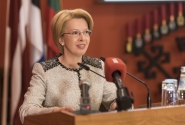
“Strong media and close transnational cooperation are key elements of dealing with the current hybrid threats”, highlighted Ināra Mūrniece, Speaker of the Saeima, opening a high-level conference dedicated to the strengthening of the security in the Baltic region on Friday, 13 May.
Speaker of the Saeima stressed that advancements in media technologies has led to new security challenges: media may be used to spread disinformation and propaganda, reaching target audiences faster and easier than ever before.
“State and non-state actors use hybrid campaigns - propaganda, cyber-attacks, terror acts, and attacks on critical infrastructure,” Mūrniece concluded, underlining that European security faces a multitude of challenges.
“No institution, nation or international actor today is capable of responding to hybrid warfare alone. This is a cross-border problem and should be addressed accordingly – at national, regional and international level,” stressed the Speaker.
Ināra Mūrniece praised the NATO Strategic Communications Centre of Excellence (Stratcom) and the Baltic Centre for Media Excellence as excellent examples of efficient response to hybrid threats. She also emphasised the growing Latvian cooperation with the Baltic and Nordic neighbours, as well as the United States in the domain of cyber security.
„We must promote cross-border information and intelligence sharing, as well as coordination efforts. We should start with the three Baltic States, and set a strong example for the rest of the EU and NATO,” said the Speaker, adding that cooperation, unity and solidarity within the EU and NATO is now more important than ever.
Ināra Mūrniece pointed out that Latvia has taken significant steps to strengthen its security. This year’s military budget has increased by 45%. She also confirmed Latvia’s commitment to increase the country’s defence spending by up to 2% of GDP by 2018.
High-level conference ‘Security in the Baltic Region: Current Developments and the Way Ahead’, hosted by the Saeima on 13 May, addresses issues related to the strengthening of media, deterring hybrid warfare, and changing strategies of NATO and the EU.
About the Baltic Assembly:
The Baltic Assembly is an interparliamentary cooperation organisation of Latvia, Estonia and Lithuania established on 8 November 1991. Each national parliament of the Baltic States is represented in the Baltic Assembly by 12 to 20 members of parliament. It is a coordinating and consultative organisation which has a right to express its opinion to the national parliaments and governments of the Baltic States, as well as the Baltic Council of Ministers, in the form of resolutions, decisions, declarations and recommendations; it also has a right to request the above-mentioned bodies to provide information on cross-border issues that are high on the Baltic Assembly’s agenda.
Photos: https://www.flickr.com/photos/saeima/sets/72157668240661376
Disclaimer & copyrights: https://www.saeima.lv/en/copyrights
Saeima Press Service







